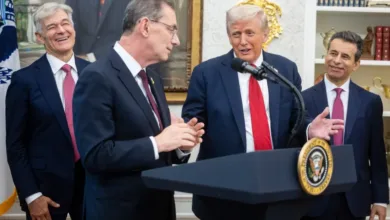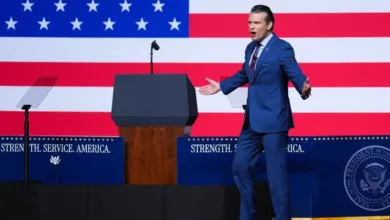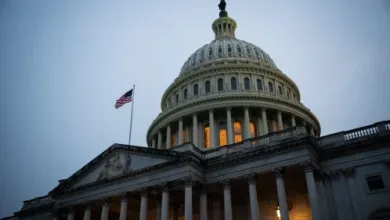Trump’s Tariff Defeat: How a U.S. Court Ruling Could Reshape Global Trade

The U.S. economy has once again been shaken by a major legal battle surrounding one of the most controversial trade policies in recent history. A federal appeals court recently struck down most of the tariffs introduced under the Trump administration, declaring them unconstitutional. This ruling has created a wave of uncertainty across American politics, business, and international markets, raising questions about the future of U.S. trade strategy and its role in shaping global commerce.
This story is dominating Trump News and U.S News, not only because of its direct impact on the American economy, but also because of its wider consequences for international relations and global markets.
The Background of Trump’s Tariff War
When Donald Trump entered the White House, he immediately launched what he called a fight for “fair trade.” His administration placed sweeping tariffs on goods from China, the European Union, Mexico, and Canada. Trump argued these tariffs would protect American workers, revive U.S. manufacturing, and push foreign governments to negotiate better trade deals.
While these measures became a central theme of Breaking News during Trump’s presidency, they also triggered trade wars, higher consumer prices, and tensions with allies. Critics warned that the tariffs were not only ineffective but also harmful to ordinary Americans. Supporters, however, saw them as a bold move to counter decades of what they considered unfair global trade practices.
The Court’s Ruling and Its Legal Significance
The appeals court decision declared that Trump had overstepped presidential powers under the International Emergency Economic Powers Act. While presidents are granted flexibility to impose tariffs during emergencies, the court found Trump’s use of the law excessive and unconstitutional.
Although the tariffs remain in place until October pending a Supreme Court appeal, this ruling marks a historic challenge to executive power. For Trump, who continues to dominate News headlines even outside the White House, it represents both a political and legal setback.
Economic Impact on the United States
From an economic perspective, the tariffs raised billions of dollars in government revenue, but they also increased costs for U.S. businesses and consumers. Many American manufacturers who relied on imported materials faced higher expenses, forcing them to raise prices or cut jobs.
Now, with the tariffs at risk of being removed, some industries could benefit from cheaper imports, while others fear losing the protection they enjoyed under Trump’s policy. Wall Street analysts are closely monitoring how this ruling could influence inflation, investment, and trade flows in the months ahead.
This uncertainty has already been reflected in World markets, where investors are preparing for potential shifts in supply chains and global partnerships.
Political Ramifications for Trump and His Rivals
Politically, the court’s ruling comes at a delicate time. Trump remains a central figure in the Republican Party, and his potential run for the 2028 presidential election continues to dominate Breaking News discussions.
His allies argue that the ruling is politically motivated and that the Supreme Court will overturn it. Opponents, meanwhile, view it as proof that Trump consistently pushed the boundaries of presidential authority. For the Biden administration and other Democratic leaders, the case offers an opportunity to reshape the trade debate ahead of the next election cycle.
Global Consequences of the Ruling
Beyond U.S. borders, the court’s decision is being watched carefully by governments and businesses worldwide. Countries that were targeted by Trump’s tariffs see this as a chance to strengthen their trade relations with Washington.
China, in particular, could benefit if tariffs are lifted, as American companies would once again find it cheaper to import goods. At the same time, European nations are eager to resolve disputes that strained transatlantic relations during Trump’s presidency.
This case therefore carries significant World implications, as it could reset global trade alliances and alter the balance of economic power.
Expert Analysis and Future Scenarios
Economists suggest several possible outcomes depending on how the Supreme Court rules. If the tariffs are permanently removed, U.S. consumers may see lower prices, but certain industries could struggle to compete with foreign imports. If the court restores the tariffs, America could continue down a path of trade protectionism, risking further isolation from global markets.
Either way, the debate has reignited broader questions about America’s role in shaping international trade and whether protectionism or free trade better serves the national interest. This ongoing conflict underscores how U.S News often reflects larger global debates about economic power, fairness, and security.
Summary and Outlook
The appeals court ruling against Trump’s tariffs is not just another legal case; it is a defining moment in the history of American trade policy. It raises pressing questions about the limits of presidential power, the future of U.S. manufacturing, and the role of the United States in the global economy.
As the case moves toward the Supreme Court, businesses, governments, and investors are bracing for a decision that could reshape global commerce. This story will remain one of the most important items in News, with wide-reaching consequences across both domestic politics and international relations.




